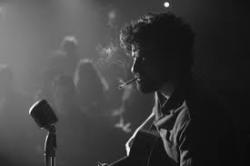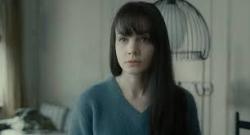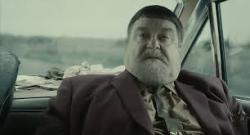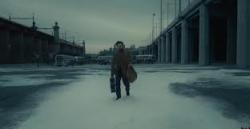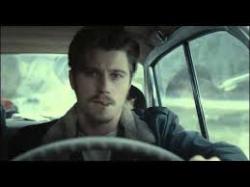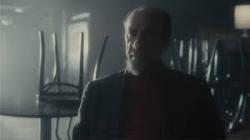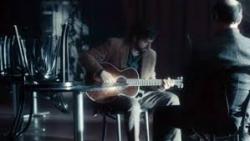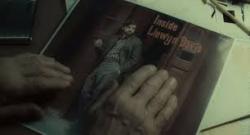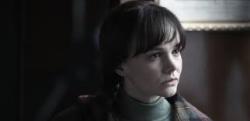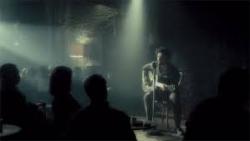He's not the messiah..... The Life of Llewyn
By Michael Roberts
“The first one now will later be last”
- Bob Dylan
Joel and Ethan Coen look at the nascent folk music scene in Greenwich Village in the winter of 1961 with the dark edged Inside Llewyn Davis, a lovingly constructed recreation of the era. Pete Seeger called the time, the ‘Great Folk Scare’ of the ‘60’s, and the Coen Brothers drop in just prior to the music bursting to prominence on to the national and international stage. Within a few short years Greenwich Village would be the touchstone of all things folk, as corporations like Columbia Records and the likes of Madison Avenue cashed in. Before this commercial bonanza however, the die hard and committed singers who lived there eked out a tough living in an unforgiving environment, tracking down obscure and 'authentic' folk gold like a secret order of aesthetic adepts, and it’s upon one of these prickly misfits, mired in a state of perpetual bewilderment and frustration, that the Coen’s focus their lens.
Llewyn Davis (Oscar Isaac) is singing a traditional song on the stage of The Gaslight, a small club in Greenwich Village, an area known for its arts community. Davis finishes the song, apologises to the manager for an incident last night, and goes out to the alley where he’s brutally beaten. The homeless Davis bounces from couch to couch, the upper West Side home of his academic supporters, big folk music fans, to the Village home of a couple who sing together around the same gigs as Llewyn, Jim (Justine Timberlake) and Jean (Carey Mulligan). To complicate Llewyn’s life it transpires that Jean is pregnant, possibly to Llewyn after an ill thought out tryst, and she decides she needs an abortion. Down on his luck and near penniless, Jim offers him a lifeline with a session at Columbia Records. An unsuccessful trip to Chicago to audition for Mr Grossman, leads to a reassessment of his career. Davis is at the crossroads as he arrives at The Gaslight to play what is possibly the last gig of his career.
T-Bone Burnett’s presence as musical director may have raised expectations on some that we were in for another sweet natured ramble into some ‘rootsy’, musical Americana, but that’s far from the case. The Coen’s frame the film as Davis’ waking nightmare, and there is no let up in the relentless series of challenges, and a cat, that life throws at him. Far from O Brother Where Art Thou? the tone of Inside Llewyn Davis sits more comfortably with A Serious Man or The Man Who Wasn’t There in the Coen’s oeuvre, a dark edged, dream-like tone, with a patina of dread hanging over the entire proceedings. Llewyn Davis is one of the most unlikeable characters in all of the Coen’s films. The cat is the only thing that gets any semblance of affection from Llewyn that isn’t predicated on quid pro quo, and it’s symbolic that he walks away from the cat, and then possibly runs it over it shortly after. The struggle of a misfit ‘trying to connect’, appropriately matched to an animal whose whole attitude seems to meow, “what’s in it for me”?
Jean keeps her pregnancy secret from Jim, and lets Llewyn know in no uncertain terms of his character failings, “You’re an arsehole, arsehole, arsehole! everything you touch turns to shit!…. King Midas’ idiot brother”! The selfish Llewyn arranges payment for an abortion, but in the process discovers something startling that brings on a period of career reassessment. In a last ditch attempt to elevate his profile he auditions for Mr Grossman (F. Murray Abraham) in Chicago, asked to play something from “inside Llewyn Davis”. Llewyn bares his soul with an evocative traditional ballad about a woman who dies in childbirth, recalling his problem with Jean, but all Grossman says is, “I don’t see any money here”. He suggests Llewyn re-unite with his partner, not realising he’s dead, Llweyn simply replies, darkly and ambiguously, “That’s good advice”.
The death of his former singing partner, Mike, is something Llewyn has not yet come to terms with, and it’s the cause of an embarrassing and vitriolic rift between llewyn and the Gorfein’s. The Coen’s gently resolve the issue at the very end, with Llewyn’s aching solo performance of the duo’s signature song, it’s a subtle and moving moment. Oscar Isaac produces a fantastic, gritty performance in a difficult role; Llewyn is a genuine narcissistic prick. Somehow he manages to evince a modicum of sympathy for Llewyn the egoist, no small feat given the scenario he’s lumbered with, notwithstanding the cat! Remarkably, Isaac performs all his songs live, and nails them brilliantly, and the faith the Coen’s show in him is obvious from the first frames, a complete and mesmerising solo rendition of Hang Me, Oh Hang Me. The film is a tour de force for Isaac, and he’s nicely supported by every other player, the Coen’s unfailing instincts in regard to casting minor roles again to the fore.
The folk scene of Llewyn’s 1961 world is an underground and hermetic one, and one that disavows the anodyne populist folk music that charted, post the early Seeger related Weavers period. The Coen’s poke some gentle fun at the commercial end of the spectrum, the one that produced the number one smash in 1958 by The Kingston Trio, the mournful murder ballad, Tom Dooley, that set music entrepreneurs aflutter trying to cash in. The Coen’s capture the Washington Square atmosphere perfectly, and the smoky ambience of the small clubs where diehard aficionado’s attempt to mine the latest folk gem from the equally earnest singers who discover and arrange ‘authentic’ folk music. The fans are represented by the Gorfeins, the decent, middle class, Upper West Side anthropologists who befriend Llewyn, and forgive him his prickly nature. The Coen’s do not touch on politics, probably wisely in that it would have complicated the scenario, as most of the Village folkies were socialists or leftists.
And so to His Bobness…. To anyone vaguely acquainted with the era, the spectre of Bob Dylan looms large over the narrative. The Coen’s hold their fire until the last frames, when a scruffy young Bob takes the Gaslight stage after Llewyn’s last gig, and (anachronistically, seeing Dylan didn’t ‘write’ this song until 1963) plays Farewell, the early blasts in a sonic salvo that will be heard around the world. Llweyn is not based on Bob, rather he’s a composite of a few Greenwich Village mainstays, Dave Van Ronk and Ramblin’ Jack Elliot amongst them, but there is something of Bob in Llewyn’s prickly nature. Dylan swam against the mainstream tide that would soon wash the folk-lite sounds of Peter, Paul and Mary up on the shores of chart success, and Jim and Jean’s shtick has resonance in relation to that iconic folk trio. Dylan’s manager was Albert Grossman, who was indeed from Chicago and who also put together and managed Peter, Paul and Mary, hence their cover version on Bob’s Blowin’ In The Wind, the rest, as they say, is history. Grossman, the real one, offered Van Ronk a spot in the trio, he declined, and it was also Van Ronk who was a former merchant seaman, offered a winter coat by his record label owner after he’d stiffed him on royalties for his album, Inside Dave Van Ronk.
Dylan slept on people’s couches and soaked up music as much as he could, hoping to break through no matter what, and took to folk music as the ticket to fame. Astonishingly Dylan was not a writer to start with, assuming all the good songs had been written, but following the example of Jack Elliot he started to write words to traditional melodies, and then a couple of years later (after The Beatles) he wrote his own tunes. The Coen’s don’t quite convey the desperate need to collect rare and unknown songs that drove those performers, Dylan was notorious for taking friends and acquaintances records and not returning them, scouring them for gems to present that no-one else was covering. Dylan was a sponge, but the Coen’s present Llewyn as a stone, (I Am A Rock?). The wall that Llewyn erects is emotional and complex, dating back to issues he had with his father, and is addressed when Llewyn visits his near geriatric Dad in a nursing home, where he plays the old sailor a touching sea-faring ballad, It’s a touching gesture of a son ‘trying to connect’, but the Coen’s deflate it as only they can.
Joel and Ethan cover the gamut of the folk wannabe’s, the marketable face of folk music that Grossman coverts is represented with the character of clean cut All- American Troy Nelson, (an amalgam of teen idols Troy Donohue and Ricky Nelson?), a cipher based on Tom Paxton, a singer who was in the military and who wrote the song Troy performs. The ‘cable knit, Aran jumper’ brigade also gets a run with a four part group singing The Auld Triangle, a nod to the Clancy Brothers types who Dylan made redundant virtually overnight. Llewyn, for all his failings, does exactly what Dylan did slightly later, in presenting a committed, no-holds-barred, intense delivery of folk that makes the mainstream folkies look lame. It’s possible the Coen’s are making a salient point about timing, in that Bob could only have happened at that moment, not before or after. Dylan's appearance is in fact the only slight ray of hope in the bleakness on Bleeker, as folk music is a continuum, and if Llewyn missed the train we at least know Bob has leapt onto the rear carriage and is soon to leap his way to the engine, overpower the engineer and open up the throttle.
When Bob Dylan was offered a recording contract by John Hammond at Columbia, he took the odd step of not recording the best of his repertoire for his eponymous first album, and instead ‘appropriated’ other songs from his peers, famously Van Ronk’s arrangement of House of the Rising Sun. This was anathema in the coinage of the day, but it speaks to how little Dylan believed in the first record, and that he would not waste his best material on what was known at Columbia as ‘Hammond’s folly’. Incredibly, for this was a much sought after contract in folk circles, he did not tell anyone in the Village that he’d done the recording, until he asked Van Ronk if he could record his song just prior to the pressings hitting the street! Van Ronk said. “I’d rather you didn’t, I’m set to record it myself”. Whoops. The irony was that the album sold very little until after Dylan broke through a few years later, and then The Animals took that arrangement and electrified it, forcing Dylan to drop it from his set list because people accused him of pinching The Animals version!
In one aspect it seems the Coen’s have opted for a Monty Python, Life of Brian approach, taking the starting point of someone close to the action, i.e. Brian instead of Jesus, Llewyn instead of another God, Bob (and at least he’s real). The obliqueness extends to Welsh overtones in Llewyn’s name, echoing the Dylan Thomas reference that informed Robert Zimmerman’s change of moniker. Joel and Ethan avoid the obvious for an oblique look at a misfit, a spiky iconoclast whose time refuses to come. The final insult is the knowledge that he’s played on a novelty song with Jim, the egregious Please Mr Kennedy, that will likely make millions, after he’d signed away any royalties for the $200 that will fund Jean’s abortion. The sardonic and unsettling edge the Coen’s imbue the film with operates from the first frame to the last, and Llewyn’s bittersweet “Au revoir”, but it’s the richness of the full and detailed tapestry, lovingly recreated, that elevates the work to the top rank of the brother’s films. It’s not every filmmaker who can eschew the obvious in sake of the quirky and make it work so fluidly, that Joel and Ethan do it so well and so consistently is outrageous.

